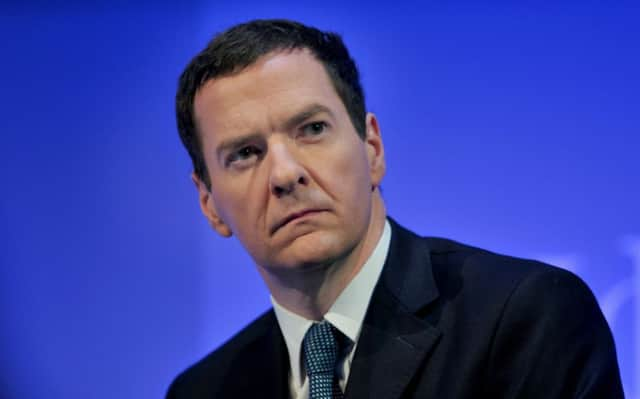Europe to reject Osborne’s banker bonus challenge


Ministers argue that the rules limiting pay-outs to no more than 200 per cent of basic salary encourage the banks to raise fixed pay instead, increasing their business risks.
The UK challenged the proposals on a number of grounds, arguing that the EU had gone beyond its remit and breached a series of legal principles.
Advertisement
Hide AdAdvertisement
Hide AdBut Advocate General Niilo Jaaskinen today delivered an opinion that “all the UK’s pleas should be rejected and that the Court of Justice dismiss the action”. It is expected to deliver its ruling next spring.
A Treasury spokesman said: “The Government notes the Advocate General of the European Court of Justice’s opinion on our legal challenge against the EU ‘bonus cap’. We are considering the opinion and its implications in detail.”
The cap means that bankers cannot be paid bonuses of more than 100 per cent, or 200 per cent if national governments decide to allow firms to increase them to this level.
But Mr Jaaskinen said it was not a “cap” since it was linked to a banker’s salary, on which there is no limit to what a bank can pay.
The measure was adopted last year, prompted by concerns that the scale of banker bonuses was one of the major contributors to the 2008 financial crisis resulting in a series of state bail-outs for firms such as Royal Bank of Scotland and Lloyds.
It was argued that the large bonus pay-outs in relation to salaries encouraged excessive risk-taking by bank employees in order to share in short-term profits but not in the cost of failures which in the most serious cases were borne by taxpayers.
Tom Gosling, head of PwC’s reward practice, said: “It seems unlikely now that the Court will overturn the Advocate General’s opinion, so banks should continue planning on the basis that the bonus cap will still be in force next year.”
The Treasury spokesman added: “The detail of the opinion also demolishes the case for the fixed ratio by pointing out that it doesn’t equate to a cap on bankers’ pay because there is no limit on basic salaries.
Advertisement
Hide AdAdvertisement
Hide Ad“This is precisely the reason why we, the PRA (Prudential Regulation Authority) and the Bank of England have been opposed to this policy.”
A spokesman for the British Bankers’ Association said: “We continue to support the Treasury’s challenge to this legislation.
“There have already been sweeping changes made to the way that bank staff are paid since the financial crisis.
“Bonuses are smaller and staff are rewarded for making decisions that benefit the businesses, shareholders and the broader economy.
“We believe this law runs counter to recent reforms and will make the system less robust by incentivising firms to increase fixed pay.
“It also puts European banks at a disadvantage when competing with firms in other parts of the world.”
The Bank of England set out plans earlier this year to allow bonuses to be clawed back up to seven years after being paid.
But in a speech this week, governor Mark Carney said it was “unfortunate” that the EU bonus cap had the “undesirable side-effect of limiting the scope for remuneration to be cut back”.
Advertisement
Hide AdAdvertisement
Hide AdMr Carney said new rules to put fixed pay at risk may now be needed, backing an idea that some staff could be paid in “performance bonds” instead of cash.
Since the EU proposals were announced, attention has switched to a new form of allowance pay for bankers, though the European Banking Authority (EBA) recently decided that these were against the new rules.
Last month, Bank of England deputy governor Andrew Bailey, who is head of the PRA, broke with protocol to reveal that he voted against the decision after the EBA incorrectly announced that it had been unanimous.
Earlier this year, state-backed Royal Bank of Scotland was blocked from paying bonuses twice the size of salaries after its plans were vetoed by the Government.
RBS said the limit exposed it to “commercial and prudential risk” as it tried to compete with bigger-spending rivals.
Cathy Jamieson, shadow financial secretary to the Treasury, said: “While working people face a cost-of-living crisis and lending to business is falling, it’s astonishing that George Osborne’s priority has been to spend taxpayers’ money fighting a cap on bankers’ bonuses.
“It shouldn’t have taken the EU to act to rein in excessive bonuses, but there has simply been no action from the Chancellor here in Britain.”